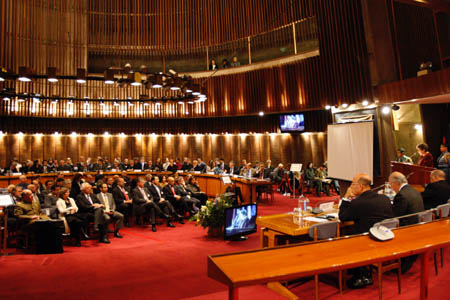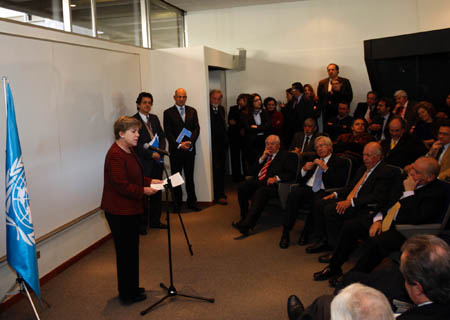New State Architecture Needed to Achieve Equality
Government authorities and senior officials from regional and international agencies discussed the role of the State in Latin America and the Caribbean.

(25 July 2011) Government authorities from several Latin American and Caribbean countries and senior officials from regional and international agencies met today in ECLAC to discuss the new role of the State in the region's development.
The International Seminar on State and Development was held in honour of Enrique V. Iglesias, Secretary-General of the Ibero-American Secretariat (SEGIB) and former Executive Secretary of ECLAC, for his renowned contribution to Latin American thinking on development and the role of the State.
Participants at the meeting agreed on the need to rethink the role of the State and strike a balance between market, State and society. As she opened the meeting, Executive Secretary of ECLAC, Alicia Bárcena, stated "We are convinced of the need for a new State architecture to enable the State to play a greater role in ensuring general well-being and implementing our countries' development strategies with a long-term vision that goes beyond its functions of ‘subsidiarity' defined by the neoliberal paradigm".
Bárcena recalled the proposals of ECLAC contained in the document Time for equality: closing gaps, opening trails, which described as fundamental pillars for the region's development the State's activities to "boost growth, promote productivity, develop greater territorial linkages, drive better employment conditions and labour institutions and provide public goods and social protection with a clear universal and redistributive vocation".
She added that "this requires the construction of social covenants where the State-market-society relationship strikes a balance that can tackle the challenges of this real change of era".
In addition to thanking ECLAC for honouring him that day, in his speech Enrique V. Iglesias also commented on the need for world governance that allows States to face major current challenges: "We need a large-scale covenant between the State and society, one that goes beyond the fiscal covenant required to maintain good macroeconomic functioning".
He also stressed the importance of politics and of the modernization of political systems: "The State has public capital and must learn to relate better to a society that is increasingly well informed and participatory".
In the main address of the seminar's opening, Ricardo Lagos Escobar outlined the various demands that each period of history has placed on States. After the world financial crisis, States are faced with the considerable challenge of tackling inequality, especially in Latin America.
The former Chilean President pointed out that it is politics, not markets, that can help to overcome the region's shortcomings in this regard: "Until now, we have focused on growth, but we have some way to go in social issues [...] There is still a very wide inequality gap between Latin America and developed countries. Better income equality translates into improved social, health and education indicators".
The State and Development seminar was divided into four round table discussions: one on the State in Latin America and the Caribbean in the era of globalization; another on the role of the State in the economy and structural change; the third on the State and regional integration; and the fourth on State, democracy and equality.
Those taking part in the debates included Danilo Astori, Vice-President of Uruguay; José Miguel Insulza, Secretary-General of the Organization of American States (OAS); José Antonio Ocampo, Columbia University Professor (United States) and former ECLAC Executive Secretary; Ernesto Ottone, Director of the Chair in Globalization and Development of the Diego Portales University (Chile); Dionisio Borda, Finance Minister of Paraguay; Temístocles Montás, Minister of Economy, Planning and Development of the Dominican Republic; José Luis Machinea, Dean of the School of Government of the Torcuato di Tella University (Argentina) and former ECLAC Executive Secretary; Corina Rodríguez, Researcher for the Argentine National Scientific and Technical Research Council (CONICET) and the Argentine Economics and Public Policy Research Centre (CIEPP); Beatriz Paredes, Chair of the Special Commission on Migration of the Mexican Chamber of Deputies; and Heraldo Muñoz, Assistant Secretary-General and Regional Director for Latin America and the Caribbean for the United Nations Development Programme (UNDP)
The seminar is taking place three months from the 21st Ibero-American Summit of Heads of State, which will be held in October in Asunción, Paraguay. It also coincided with the completion of the renovation of the ECLAC building, following the damage caused by the earthquake that struck central Chile on 27 February 2010. As she opened the new premises, the ECLAC Executive Secretary stated that the emblematic building had become the "house" of Latin America in the region.
In the words of Alicia Bárcena: "We carried out a process of renovation and restoration on this historic building. We wanted to imbue it with a sense of the new wind of environmental sustainability blowing through the region, without changing the work of architect Emilio Duhart and the heritage it has. I thank all the colleagues who made this possible".
The ceremony also saw the unveiling of a bust of Raúl Prebisch, former Executive Secretary of ECLAC and considered one of the main founders of this regional commission of the United Nations.
Also see:
Any queries should be addressed to the ECLAC Public Information and Web Services Section. E-mail: dpisantiago@cepal.org; Telephone: (56 2) 210 2040.
Follow us on: Twitter, Facebook, Flickr and YouTube.
Related content
Seminario sobre Estado y desarrollo
Por Alicia Bárcena, Secretaria Ejecutiva de la CEPAL

ECLAC Pays Homage to Enrique V. Iglesias
The auditorium of the ECLAC Latin American and Caribbean Institute for Economic and Social Planning (ILPES) will bear the name of the current Ibero-American Secretary-General.
Country(ies)
- Latin America and the Caribbean
Contact
Public Information Unit
- prensa@cepal.org
- (56 2) 2210 2040